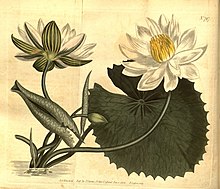Tiger lotus
| Tiger lotus | ||||||||||||
|---|---|---|---|---|---|---|---|---|---|---|---|---|

Tiger lotus ( Nymphaea lotus ) |
||||||||||||
| Systematics | ||||||||||||
|
||||||||||||
| Scientific name | ||||||||||||
| Nymphaea lotus | ||||||||||||
| L. |
The tiger lotus ( Nymphaea lotus ; Syn .: Nymphaea zenkeri ) is a species from the genus of water lilies ( Nymphaea ) in the plant family of the water lily plants (Nymphaeaceae). It is native to Africa and Southeast Asia . The species, also known as the White Egyptian Lotus Flower, has two color morphs , one with green leaves and red spots (Green Tiger Lotus) and one morph with red leaves (Red Tiger Lotus).
description
Nymphaea lotus is a perennial herbaceous plant . This aquatic plant forms rhizomes and stolons . In addition to floating leaves, the plant forms strong submerged leaves that are 10 to 18 centimeters long and 8 to 10 centimeters wide.
The single standing, hermaphrodite flower has a diameter of 12 to 25 centimeters. It opens at night for several nights in a row. The four sepals are green. There are 16 to 20 white petals . The approximately 75 stamens are yellow.
The seed is 1.4 to 1.8 × 0.9 to 1.2 mm in size and thus about 1.5 to 1.6 times longer than it is wide.
The number of chromosomes is 2n = 84.
Systematics
A variety called Nymphaea lotus var. Thermalis (DC.) Tuzson , the thermal water lily, occurs in a lake near Oradea in Romania , the warm water of which is fed by an underground thermal spring.
Occurrence
Nymphaea lotus is native to Egypt, tropical Africa, southern Africa and Madagascar. The isolated occurrence in north-western Romania is also considered original. In Louisiana, Florida, El Salvador, Costa Rica, Panama, Colombia, Venezuela, Guyana and Brazil, there is protracted nature a neophyte .
Cultural history
Lotus flowers were used as sacrifices by the ancient Egyptians . Dried flowers of tiger lotus and Nymphaea caerulea were found in the grave of Ramses II .
use
In the aquarium hobby , Nymphae lotus (also called green tiger lotus or red tiger lotus and white lotus flower, depending on the variant ) is used as an aquarium plant , and varieties such as “green” and “red” are also available in stores.
literature
- John H. Wiersema: Nymphaea. : Nymphaea lotus , In: Flora of North America Editorial Committee (Ed.): Flora of North America North of Mexico , Volume 3 - Magnoliidae and Hamamelidae , Oxford University Press, New York and Oxford, 1997, ISBN 0-19-511246- 6 . (Section description)
Web links
- Nymphaea lotus . In: U. Brunken, M. Schmidt, S. Dressler, T. Janssen, A. Thiombiano, G. Zizka: West African plants - A Photo Guide. Senckenberg Research Institute, Frankfurt am Main 2008.
Individual evidence
- ^ Nymphaea lotus at Tropicos.org. In: IPCN Chromosome Reports . Missouri Botanical Garden, St. Louis
- ↑ a b c Nymphaea in the Germplasm Resources Information Network (GRIN), USDA , ARS , National Genetic Resources Program. National Germplasm Resources Laboratory, Beltsville, Maryland. Retrieved May 30, 2018.
- ^ Philip Swindells, The Master Book of the Water Garden. London, Salamander 1997, 15
- ↑ Christel Kasselmann : aquarium plants. Ulmer Verlag, Stuttgart 1995; 2nd, revised and expanded edition 1999, ISBN 3-8001-7454-5 , pp. 379–381.



